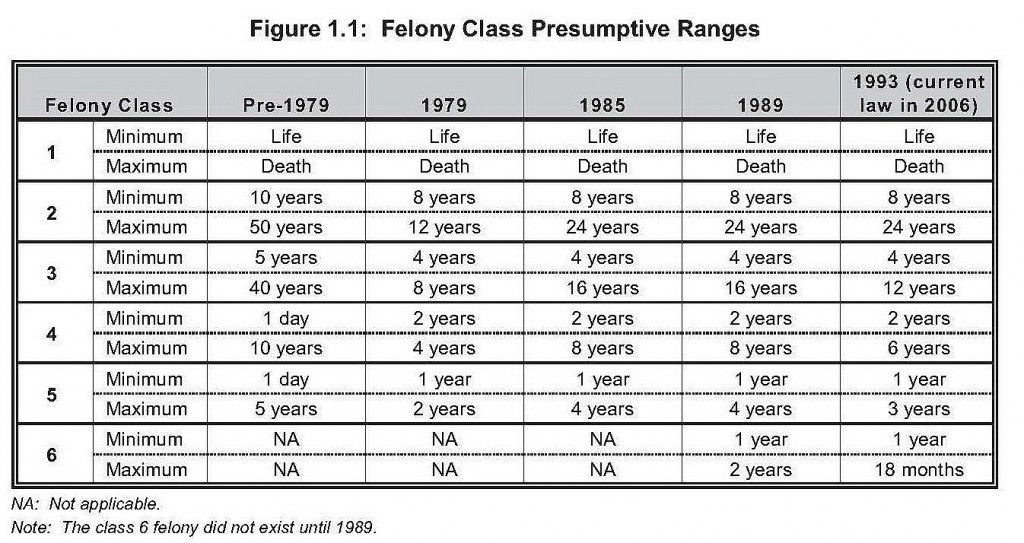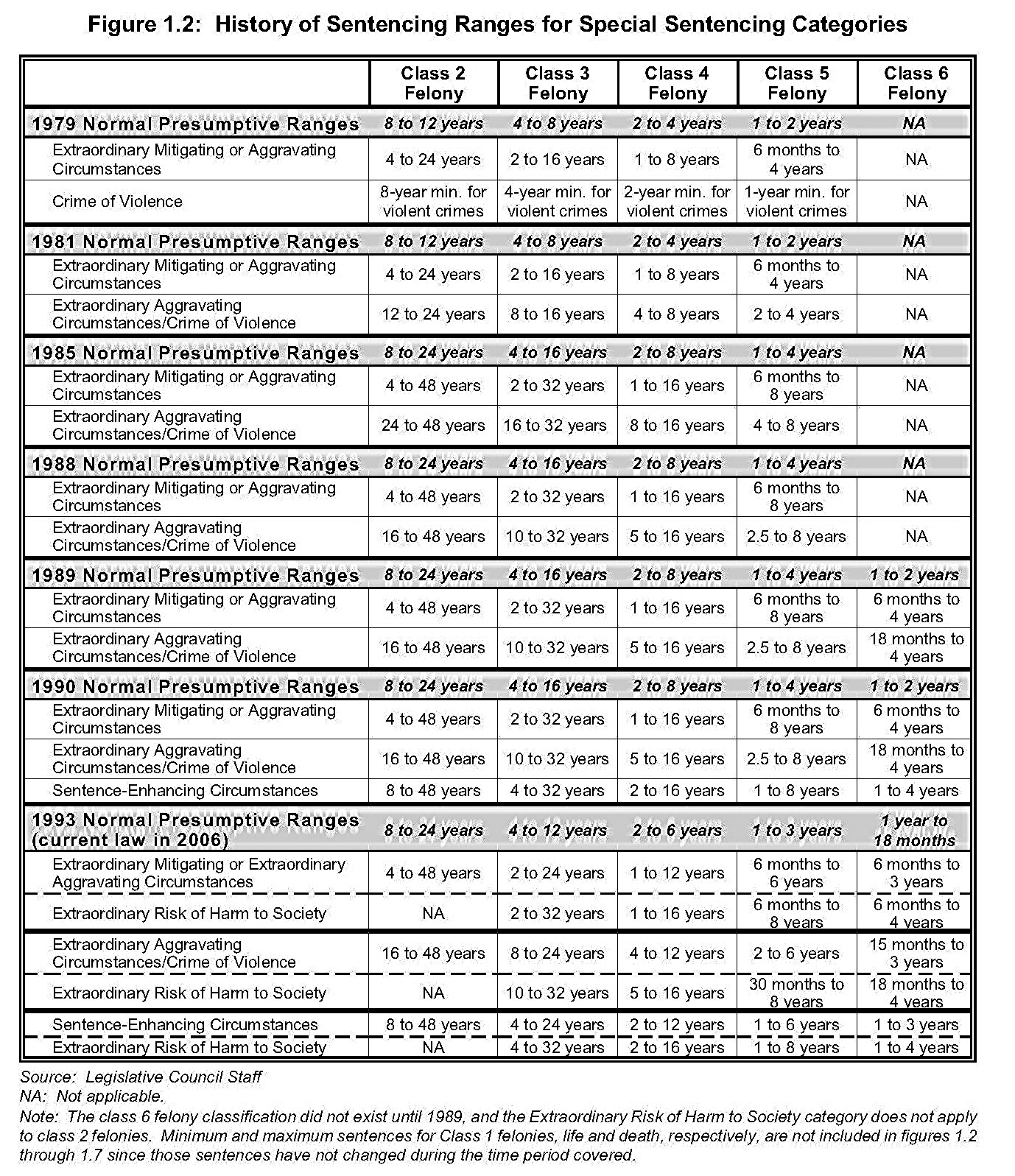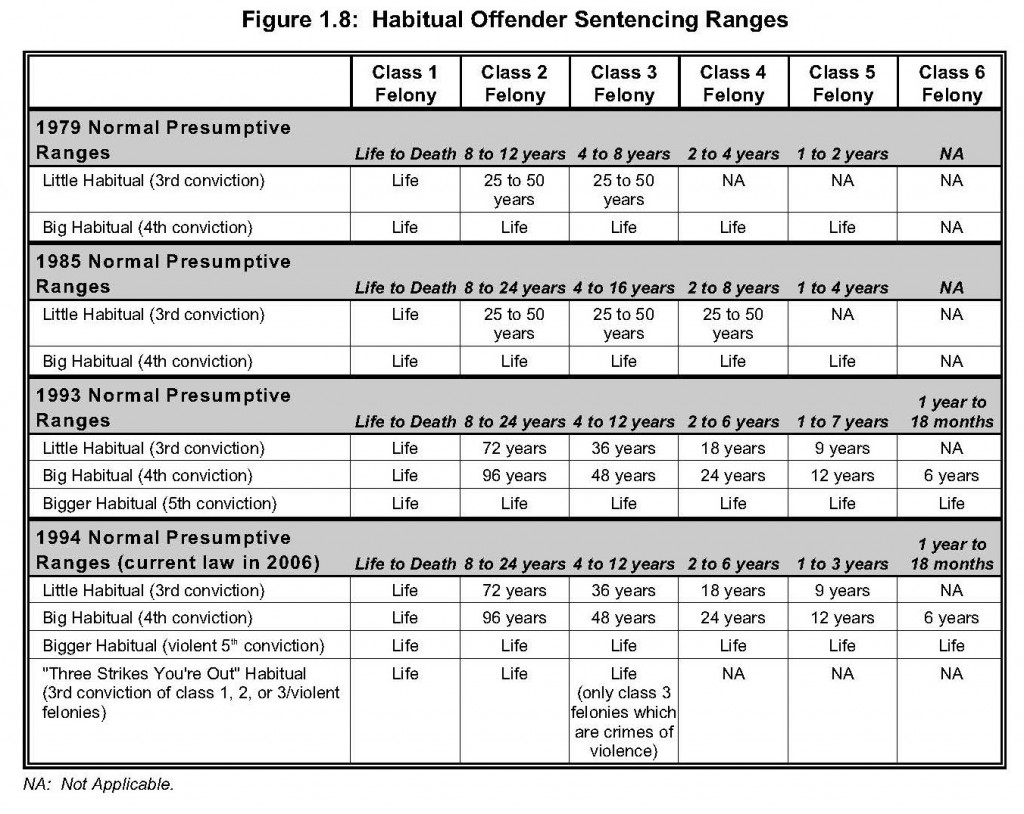




Colorado Criminal Law – Understanding Colorado’s Scheme of Adult Sentencing Laws
This web page provides a comprehensive overview of Colorado’s sentencing laws since 1979 – with excellent charts to help understand how sentences are imposed. This web page addresses Colorado’s sentencing ranges, Colorado’s special sentencing categories, and Colorado’s habitual offender sentencing laws.
In some cases Colorado judges have the discretion to sentence offenders to as they would like. In others, mandatory sentencing and sex offender sentencing – judges are compelled to sentence in very specific ways. Their discretion to act as judges is taken away. This web page does not address sex offender sentencing – please see my other website for that specific area.
Colorado’s Complex Criminal Case Sentencing Laws
Colorado’s sentencing laws are complex and have varying levels of application for various types of offenses. This page focuses on the variables which affect the sentence handed down by a judge.
Earned Time Only Applied After Sentencing
Once an offender has entered prison, the sentence may subsequently be reduced by earned time. However, earned time is applied post-sentence only for the purpose of determining a parole eligibility date. Further, earned time does not change or reduce the sentence handed down by the sentencing court, it reduces the time served in prison.
Colorado’s Presumptive Sentencing Base
Here is a chart that shows the presumed sentences for Colorado Felony Cases:
Chart I: Colorado Presumptive Felony Range Sentencing Chart
The presumptive ranges specified in the previous section are the base from which judges calculate sentences. The chart is a helpful starting point to understand where MOST felony cases begin UNLESS they are in the following special categories.
Colorado’s Special Sentencing Laws – Creating Specific Categories for Certain Offenders
However, since 1979, the General Assembly has adopted several special sentencing categories which require longer sentences for offenders convicted of certain more serious crimes. Sentences in these special sentencing categories are intended to provide for longer sentences outside of the presumptive range, for particularly violent crimes or when certain circumstances are present for the crime or the offender.
There are five special sentencing categories as follows
crimes with extraordinary mitigating or aggravating circumstances;
crimes of violence;
crimes with extraordinary aggravating circumstances;
crimes with sentence-enhancing circumstances; and
crimes presenting an extraordinary risk of harm to society.
Here is a Chart Showing a Comparison of Presumptive Sentencing Ranges in Colorado as compared to the Special Sentencing Categories
Chart II Colorado Presumptive Sentencing Comparison to Special Category Sentencing
 Colorado Sentencing Under Extraordinary Mitigating or Aggravating Circumstances (Section 18-1.3-401 (6), C.R.S.)
Colorado Sentencing Under Extraordinary Mitigating or Aggravating Circumstances (Section 18-1.3-401 (6), C.R.S.)
The court may impose a sentence that is lesser or greater than those in the presumptive range when the court finds that extraordinary mitigating or aggravating circumstances are present.
Aggravating or mitigating factors may be determined by the court based on evidence in the record at the sentencing hearing and information contained in the presentence investigation report.
The court may not impose a sentence which is less than one-half of the minimum sentence in the presumptive range, and may not impose a sentence that is not more than twice the maximum in the presumptive range. The minimum and maximum sentencing ranges allowed after applying extraordinary mitigating or aggravating circumstances are listed in the following chart:
Chart III: Colorado Sentencing Under Extraordinary Mitigating or Aggravating Circumstances
Colorado Sentencing for Crimes of Violence (Section 18-1.3-406, C.R.S.)
Any offender convicted of a crime of violence must be sentenced to a prison term which is at least at the midpoint in the presumptive range but not more than twice the maximum term.
The following offenses which are committed, conspired to be committed, or attempted to be committed are specified in statute as crimes of violence when a person:
(a) used, or possessed and threatened the use of, a deadly weapon;
or
(b) caused serious bodily injury or death.
These crimes of violence are contained within the following special sentencing categories: crimes with extraordinary aggravating circumstances and crimes presenting an extraordinary risk of harm to society:
• a crime against an at-risk adult or at-risk juvenile;
• murder;
• first or second degree assault;
• kidnapping;
• a sexual offense;
• aggravated robbery;
• first degree arson;
• first or second degree burglary;
• escape;
• criminal extortion; or
• any unlawful sexual offense in which the defendant caused bodily injury to the victim or in which the defendant used threat, intimidation, or force against the victim.
Chart IV – Colorado Crimes of Violence
Extraordinary Aggravating Circumstances (Section 18-1.3-401 (8), C.R.S.)
An offender convicted of a crime with extraordinary aggravating circumstances must be sentenced to a term of at least the midpoint in the presumptive range but not more than twice the maximum term. Offenders committing offenses under the following scenarios are charged with a crime which has extraordinary aggravating circumstances:
• the defendant is convicted of a Section 18-1.3-406, C.R.S., crime of violence;
• the defendant was on parole for another felony at the time he or she committed the felony offense;
• the defendant was on probation or was on bond while awaiting sentencing following revocation of probation for another felony when he or she committed the felony offense;
• the defendant was under confinement, in prison, or in any correctional institution as a convicted felon, or an escapee from any correctional institution for another felony when he or she committed the felony offense;
• the defendant was on appeal bond when he or she committed the felony offense following a conviction for a previous felony; or
• the defendant is less than 18 years of age and, at the time he or she committed the offense, was on probation for or on bond while awaiting sentencing following revocation of probation for another offense that would have been a felony if committed by an adult.
Crimes Presenting an Extraordinary Risk of Harm to Society (Section 18-1.3-401 (10), C.R.S.)
Sentences for offenders convicted of crimes presenting an extraordinary risk of harm to society are increased as follows:
• the maximum sentence in the presumptive range is increased by four years for class 3 felonies;
• the maximum sentence in the presumptive range is increased by two years for class 4 felonies;
• the maximum sentence in the presumptive range is increased by one year for class 5 felonies;
• the maximum sentence in the presumptive range is increased by six months for class 6 felonies; and
• the maximum sentence for misdemeanors is increased by six months.
Felony offenses which present an extraordinary risk of harm to society include the following:
• aggravated robbery;
• child abuse;
• unlawful distribution, manufacturing, dispensing, sale, or possession of a controlled
substance with the intent to sell, distribute, manufacture, or dispense;
• any Section 18-1.3-406, C.R.S., crime of violence (see page 6 for a listing of these crimes);
• stalking; and
• sale or distribution of materials to manufacture controlled substances.
Misdemeanor crimes which present an extraordinary risk of harm to society include the following (Section 18-1.3-501 (3), C.R.S.):
• third degree assault;
• class 1 misdemeanor sexual assault where the victim is at least 15 years old but less
than 17 years old and the actor is at least ten years older than the victim and not the
victim’s spouse;
• class 1 misdemeanor unlawful sexual contact;
• knowing or reckless child abuse resulting in injury other than serious bodily injury;
• violation of a protection order (second and subsequent offenses):
• class 1 misdemeanor failure to register as a sex offender.
Chart VI: Sentences for Crimes Presenting Extraordinary Risk of Harm to Society
Here
Colorado’s Habitual Offender Statutes
Sentencing for habitual offenders bypasses the presumptive sentencing ranges and requires judges to sentence habitual offenders to a determinate sentence that is significantly higher than the maximum in the felony class presumptive ranges.
Since 1979, the habitual offender statute has evolved from two levels of habitual offenders — the “little habitual” and the “big habitual” — to four levels of habitual offenders today: the “little habitual;” the “big habitual;” the “bigger habitual;” and the “three strikes you’re out” habitual.
Chart VII: The major changes in the habitual offender statutes since 1979.
Habitual Sentencing Ranges
Sentencing under the habitual offender statutes has not been amended since 1994
Following is a brief explanation of when and how each of these habitual sentences applies.
Habitual Offender Sentencing Ranges
The “little habitual.” Offenders convicted of a class 1, 2, 3, 4, or 5 felony who, within ten years of the date of the commission of the offense, have twice previously been convicted of a felony in Colorado, another state, or in federal court are adjudicated habitual offenders under the little habitual statute.
The sentencing court is required to sentence such offenders to a term of imprisonment which is three times the maximum of the presumptive range for the felony class for which the person is convicted. The General Assembly chose not to apply the little habitual to class 6 felonies.
The “big habitual.” Offenders convicted of a fourth felony, regardless of the felony class, in Colorado, another state, or in federal court are adjudicated habitual offenders under the big habitual statute. The sentencing court is required to sentence such offenders to a term of imprisonment which is four times the maximum in the presumptive range for the class of felony for which the person is convicted.
The “bigger habitual.” Any offender convicted and sentenced under the big habitual statute, who is subsequently convicted of a felony which is a crime of violence as defined by Section 18-1.3-406, C.R.S., is adjudicated an habitual offender under the bigger habitual statute.
Offenders convicted of the bigger habitual are to be sentenced to a term of life imprisonment. Offenders sentenced to life imprisonment under this provision are ineligible for parole until serving at least 40 calendar years.
The “three strikes you’re out” habitual. This level of habitual offender applies to offenders convicted of a third class 1, 2, or 3 felony which is a crime of violence as defined in Section 18-1.3-406, C.R.S. Such offenders are to be adjudicated an habitual offender and are to be sentenced to a term of life imprisonment. Offenders sentenced under the three strikes provisions are ineligible for parole until serving at least 40 calendar years.















